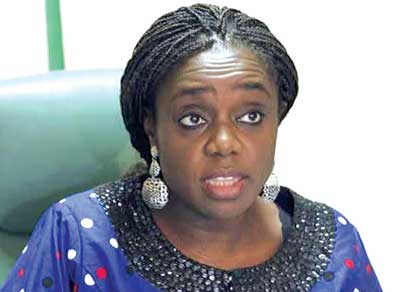The Federal Government has said that it will begin full implementation of the 2017 Revised Export and Import Guidelines on January 1, 2018.
The Minister of Finance, Mrs. Kemi Adeosun who disclosed this at a one day sensitization workshop with the theme: “Understanding the Nigerian Revised Import and Export Guidelines, Procedures and Documentation Requirements for Ease of Doing Business” held in Lagos Thursday said that the guidelines had been circulated to the relevant MDAs since April this year for onward transmission to other stakeholders under their respective jurisdictions.
Represented by the Director Home Finance of the Ministry, Mrs. Olubunmi Siyanbola, Mrs. Adeosun noted that the guidelines were also downloaded onto the Ministry’s website for the information of the trading public.
According to her,”The plan was for this workshop to take place earlier than today to enable us allow a three-month grace period before full implementation of the guidelines, especially in recognition of the time lag that might be required for the commencement of full implementation of the government policy on mandatory palletization of all containerize cargo imported into Nigeria.
“However, owing to some unforeseen circumstances, the actualization of the plan was not possible. All the same, it is certain that every stakeholder is fully aware of the policy and this workshop is meant to formally present the guidelines and collate all observations and comments with a view to taking appropriate action.
“After due consultations with the relevant key stakeholder MDAs, the effective date for full implementation of guidelines was agreed upon, taking into account the need to give allowance for imports already prepared for shipment into Nigeria. On this note, I wish to announce that the Export and Import Guidelines will be fully implemented with effect from 1/1/2018.
“However, goods already loaded for shipment to Nigeria prior to this date will not be affected by the palletization policy. Let me also say that we have examined all concerns expressed by the trading public regarding the palletization policy of the government. The list of categories of goods that may be exempted from palletization, where it is absolutely necessary will be placed on the websites of the Federal Ministry of Finance and the Nigeria Customs Service (NCS) shortly”.
The Minister drew the attention of the participants to some measures introduced by the present government to facilitate trading across Nigerian borders to include reduction of documentation requirements from ten to seven for export and from fourteen to eight for import adding that additional responsibilities had been given to the Nigeria Customs Service, the Nigerian Ports Authority and shipping lines/other carriers.
“In addition, sanctions have been introduced to enforce compliance. The additional responsibilities are as follow; Nigeria Customs Service shall coordinate the Mandatory Joint Examination and sign -off Form within the official working hours, including Saturdays, NCS shall make available the shipping manifest to other examination agencies as soon as they are received to enable enough time for Risk Assessment, Nigeria Integrated Customs Information System (NICIS) should be strengthened to accommodate more agencies.
“Shipping Lines and other carriers shall transmit to the NCS and Nigerian Ports Authority (NPA) the cargo manifest before leaving the ports of call to Nigeria, Shipping Lines shall ensure that Nigeria bound containerized cargo are palletized. In addition, a new Section H has been introduced, which states the responsibilities of the Nigerian Ports Authority (NPA): Shall receive cargo manifest from shipping lines before the ship leaves the last port of call and circulate to other regulatory agencies for risk assessment and profiling, shall be responsible for traffic management of vessels, shall ensure pilotage of vessels.
“The sanctions introduced with respect to export is to ensure timely payment of NESS levy and repatriation of export proceeds within the prescribed period, forestall sharp practices by banks as well as compel the government appointed Pre-shipment Inspection Agents to ensure timely scheduling of inspection and issuance of Clean Certificate of Inspection (CCI), regular monthly reporting, confirmation of proper documentation of export by the exporters and forestall export of substandard goods from Nigeria”, she said.
She added that the importance of implementing the guidelines to the later was not in doubt even as she stated that where it became absolutely necessary to make some adjustments in order to further facilitate trade in the interest of Nigeria as a nation, appropriate action would be taken.
She further said that the implementation of the following measures will not be compromised: (i) Processing of Nigeria Export Proceeds (NXP) forms by the Authorized dealer Banks (ADBs) within 48 hours of submission by the exporters. (ii) Transmission of the processed NXP form by the ADBs to the exporters within 24 hours. (iii) Forwarding of the processed NXP forms to the Pre-shipment Inspection Agents (PIAs) by the ADBs within 3 days of receipt from exporters.
Others are: (iv) The lifespan of the NXP form os six months, after which it can be extended by 90 days. Further extension is subject to the approval of the Trade and Exchange Department, Central Bank of Nigeria. (v) PIAs must schedule inspection within 48 hours of receipt of NXP form and issue Clean Certificate of Inspection (CCI) within 72 hours post inspection. (vi) PIAs must maintain a functional interactive website which should enable online scheduling of inspection and processing of any relevant export document.
“From the foregoing, it is explicit that the exporters, ADBs and PIAs have critical roles to play for the achievement of facilitating trade across borders”, she concluded.
Send your news, press releases/articles to augustinenwadinamuo@yahoo.com. Also, follow us on Twitter @reportersinfo and on Facebook on facebook.com/primetimereporters or call the editor on 07030661526, 08053908817.

